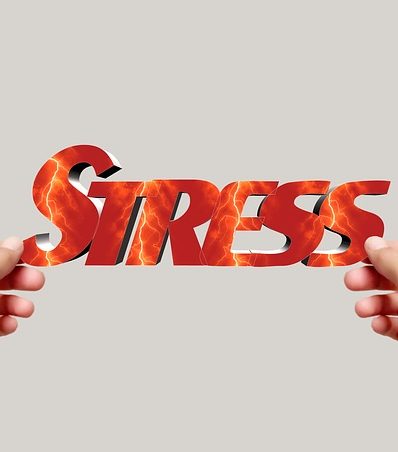Many of the signs of stress are relatively straightforward and easy to see. In fact, most people inherently know when they are under too much stress. These more obvious signs include feeling stressed out, feeling overwhelmed with responsibility, high blood pressure, anxiety, agitation, heartburn, and difficulty falling asleep. There are many less obvious signs like difficulty staying asleep, headaches, weight gain, difficulty losing abdominal fat, heart palpitations, indigestion, bowel disorders, constipation, diarrhea, abnormal hair loss, acne, and shingles to name a few.
What’s on your mind? What’s in your mind? Where is your mind?
You know that stress is a problem when your mind is occupied with things that your body is not presently facing. When you are thinking about the past or future too much and neglecting the present moment. You also know stress is a problem when you get stressed out by relatively small or unimportant things. Remember the sayings, “don’t sweat the small things”, and “don’t make mountains out of molehills”. If you are doing these things and have difficulty changing it is time to seek help from a counselor, life coach, or physician.
TCM philosophy
In Traditional Chinese Medicine and many other traditional medical philosophies emotions are not seen as good or bad. Since all emotions exist they are seen to serve purpose. In Western cultures, we often think of emotions like anger, sadness, fear, and regret as being “bad”. However, the traditional belief is that these emotions are just as important and functional as “good” emotions like happiness, satisfaction, and joy. All emotions “good” or “bad” have the same potential problems. When they are in excess or deficient they lead to emotional and energetic imbalance.
Emotional imbalance leads to anxiety, depression, and other emotional disorders. In TCM philosophy it is important to honor emotions, process them, and then let them go. This prevents us from neglecting emotions and it prevents emotions from lingering. The Traditional Chinese approach to stress management and emotional health can be very helpful for many people.
Testing
Physical Exam
A good physical exam should look for the signs of stress like high or low blood pressure, abnormal orthostatic blood pressure, the response of the pupils to light, rapid or thready pulse, abnormal hair loss, poor wound healing, and digestive disturbances.
Orthostatic blood pressure is extremely valuable to check. This is the change of blood pressure when a patient goes from seated to standing. When the adrenal glands are able to produce adrenaline appropriately blood pressure increases. However, when the adrenal glands are not working properly blood pressure will drop upon rising.
Blood Tests
Blood tests are not very useful for identifying stress. However, certain blood tests can give some valuable information for the health of organs that are often injured with chronic stress. It is very important to investigate the health of the thyroid gland and the conversion rate of thyroid hormones. However, many people who suffer from thyroid conditions do so unknowingly because the proper testing was not conducted.
A thorough thyroid panel includes TSH, Free T3, Free T4, and TPO. TSH identifies how well the pituitary gland is communicating with the thyroid gland. Free T3 and Free T4 identifies the levels of each of these hormones and gives a very good indication for how well T4 is converting to T3. TPO is a marker for autoimmune thyroid disease. The most common form of hypothyroid is autoimmune and it is very important to routinely test for this so that it is not overlooked.
Saliva Tests
Saliva testing is the most accurate way to identify imbalances in adrenal gland hormones and sex hormones. An adrenal gland panel should include at least 4 samples identifying cortisol levels. This shows the amount of cortisol in the system at 4 specific times in the day and compares your levels to the ideal. An adrenal gland panel should also include DHEA. Low levels of DHEA are a major sign of adrenal gland fatigue or exhaustion and often indicate problems with sex hormone production.
A sex hormone panel can identify the toll stress has taken on sex hormone production. This can be very important for women, especially women looking to conceive or women experiencing menopause-related complications. A sex hormone panel should include estrone, estradiol, estriol, progesterone, and testosterone. Imbalances in any of these sex hormones can be treated with natural agents.
Heart Rate Variability
Heart rate variability (HRV) is a testing measure that identifies and evaluates the variability in timing between heart contractions. Through extensive research over several decades many patterns of heart rate variability were discovered. These patterns are very good indicators of autonomic nervous system function and cardiovascular health. HRV testing has become very well accepted as an accurate and reliable prognostic indicator for several health measures.
Heart rate variability testing can be used as an assessment tool for the autonomic nervous system. It is also accepted as a measure for overall health and useful for assessment of cardiovascular health and diabetes. HRV testing can be used to evaluate how well the body is able to self-regulate during and after stress. It can be used to promote optimal recovery after exercise and training. Some HRV testing units can also be used therapeutically to teach patients how to shift the body away from sympathetic dominance and into parasympathetic dominance.







